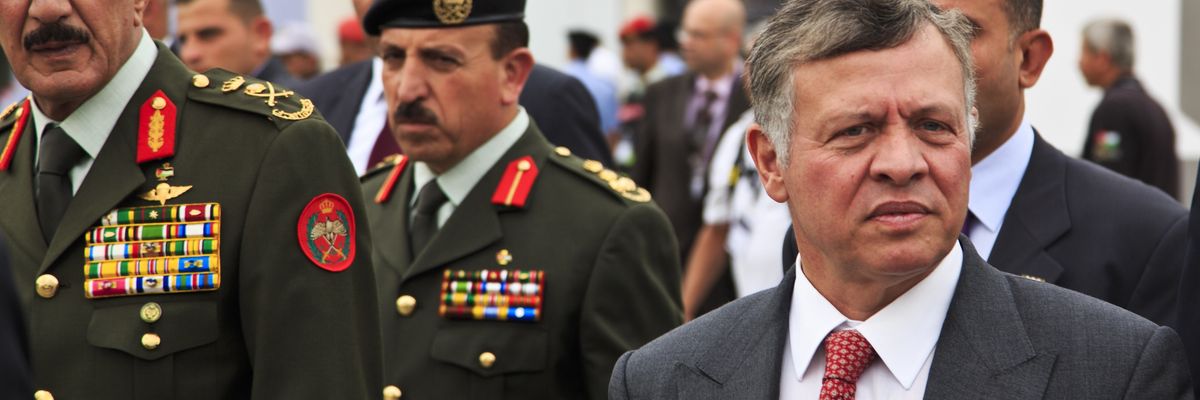On Wednesday, the Jordanian government declared that it had banned the Muslim Brotherhood, an Islamist movement that has long been active in the kingdom.
The announcement followed arrests last week of 16 members of the group for allegedly plotting an attack inside Jordan. The interior minister stated that the group and all its affiliated activities were illegal.
It was not immediately clear what impact the ban would have on the Islamic Action Front, the political party affiliated with the Brotherhood, which won a plurality of votes in last fall’s parliamentary election. The party tried to distance itself from the Brotherhood during a press conference on Wednesday, saying it would continue to operate as an independent political party with no affiliation and “within the limits of the law.”
Following the Hamas attack on southern Israel on October 7, 2023, and Israel’s subsequent campaign to bomb and blockade Gaza, the Islamic Action Front became significantly more vocal in its longstanding criticism of Israel, as well as of the 1994 Jordanian-Israeli peace treaty. The party’s critique reflected widespread rage among Jordanians, approximately half of whom are originally from historic Palestine, provoked by Israel’s brutal military campaign in Gaza, which has killed more than 50,000 people, mostly women and children.
That anger has been expressed in frequent public demonstrations as well as a widespread boycott of American and European products, due to these countries’ support for Israel’s actions.
The IAF translated public dissatisfaction with the Jordanian government’s perceived complicity in Israel’s war into electoral success in last September’s parliamentary elections. In a statement to the Jordan News in response to the banning of the Brotherhood, Zaki Bani Irshaid, the former secretary general of the Islamic Action Front, criticized the government’s decision for stoking internal division at a time when Jordan faced an existential threat from Israel’s creeping annexation of the West Bank. If Israel tried to force the three million Palestinians who live in the West Bank across the border into Jordan, the continued rule of King Abdullah and the Hashemite monarchy would likely be seriously threatened.
Anger at the king’s perceived willingness to effectively acquiesce to Israel’s destruction of Gaza raises questions as to why he outlawed the Brotherhood now, which risks provoking greater unrest. The announcement was made while a Saudi delegation, including Crown Prince Mohammed bin Salman, was visiting Amman, prompting speculation that Abdullah may have wished to demonstrate his anti-Islamist bona fides.
The Saudi government has waged a years-long campaign against the Saudi Muslim Brotherhood as it attempts to transform its approach to Islam under the auspices of MbS’s Vision 2030. Jordan has long relied on Saudi Arabia, as well as the United States, for financial support. Last year, Riyadh completed a $250 million aid package for Jordan. With U.S. President Donald Trump having suspended the $1.45 billion the U.S. annually sends to Jordan, Abdullah is likely eager to secure other sources of funding.
Yet this is not the first time that Abdullah has targeted the group. In a 2013 interview, he described the Brotherhood as “run by wolves in sheep’s clothing.” In 2015, the government helped to orchestrate a split between the group’s so-called “hawks” and “doves,” allowing the latter to retain control of all of the Brotherhood’s assets. In 2016, the government closed the offices of the so-called “hawks,” after preventing them from holding elections for the group’s internal leadership. All of these reflect Abdullah’s general suspicion of the Brotherhood and its popularity.
Yet historically, the Jordanian branch of Brotherhood was known as the “loyal opposition.” In contrast to the repression suffered by the original Muslim Brotherhood in Egypt and some of its branches elsewhere around the region, the Jordanian monarchy has tolerated the group, which in turn avoided openly challenging the king’s rule. The group itself is as old as Jordan itself — both of them were established in 1946.
During the reign of King Hussein (1952-1999), the group was permitted to operate, including by running schools and charities and other social services. His son Abdullah took the throne not long before the 9/11 attacks transformed the U.S. approach to the Middle East. Abdullah was eager to partner with Washington, including by hosting CIA “black sites” for the detention, interrogation, and torture of suspected Al Qaeda militants and assisting in the U.S. invasion of Iraq in 2003.
As counter-terrorism dominated the U.S. security agenda, Abdullah sought to portray himself as a “moderate Muslim partner” against violent extremism. Under the rubric of “moderate Islam” versus “extremist Islam,” Abdullah, like many regional leaders, falsely portrayed Islamist movements, despite their explicit rejection of violence, as supportive of terrorism, if not the actual perpetrators, and thus essentially equivalent. Under this framework, Abdullah could more easily depict the Brotherhood as suspect.
His latest move to repress the group likely reflects his concern that opposition to his ongoing partnership with Israel is growing. Across much of the Middle East, Arab publics continue to watch in horror as Israel violated its ceasefire with Hamas and then returned to pounding Gaza with renewed ferocity while simultaneously preventing all aid, food, or medicine from entering the territory since March 2. In the intervening 53 days, the risk of acute malnutrition has grown, with the UN World Food Program warning that hundreds of thousands of people are at risk.
Abdullah’s crackdown on the Muslim Brotherhood will likely do little to quell his population’s growing frustration as more children succumb to starvation in Gaza.
- Jordan braces as Israeli annexation of West Bank looms ›
- Jordan’s Abdullah at White House, looking down the barrel of a gun ›
- 'Devastating' Arab stalemate over what 'to do' about Gaza | Responsible Statecraft ›
- Who's behind push to designate Muslim Brotherhood a terror group? | Responsible Statecraft ›
- Trump designates 3 branches of Muslim Brotherhood as terror groups ›
















